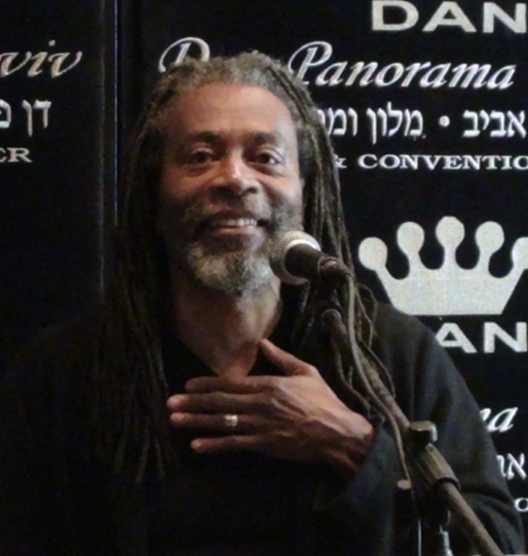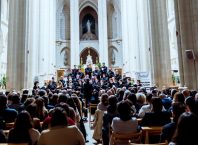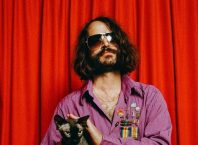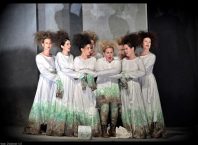
“I came here to feed my spirit,” said Bobby McFerrin, one of the most fascinating, versatile vocalists around. McFerrin returns to Israel after a 16 year absence to host the Tel Aviv White City Music Festival, which will take place at the Port of Tel Aviv from May 1 – 10, 2012.
McFerrin will be hosting several guest artists in his concerts: May 1st with Ahinoam Nini (Noa) and Gil Dor, Harel Shachal, Muna Msheal, Shlomo Bar, and Oud player Ilan Ben Ami; May 3rd with Gadi Lehavi, The Voices of Peace Choir, and Amos Hoffman; May 4th with Mira Awad, Gershon Wiserfirer and Mayumana; and May 7th with Avishai Cohen, Victoria Hanna and Idan Raichel.
McFerrin is a wellspring of sound, creativity and energy.
Listening to the musician at a press meeting that took place this morning in Tel Aviv offered some insight into the source of his music, with certain words recurring in his conversation: work, discipline, faith, mind, and heart. In response to a comment that his dedication to his art and vocal perfection might be a “dying breed” McFerrin was quietly optimistic, and said, “It can seem that way. So many confusing things hitting one another, all those balls up in the air… we’ve become so busy, so crowded. I don’t think that there will ever be a generation when there isn’t someone devoted to cultivating a loving mind. In fact that’s an acronym: CALM, I’m always working on that.”
Speech, sound and song flow and merged in McFerrin’s conversation as he talked about the early days of his career.
McFerrin recalled, “I was very much aware of Keith Jarrett and wondered what would it be like for a singer to be onstage alone? …So I took about 6 years, practiced every day for two hours for six years and then I called my manager Linda and said: you know that tour that we have booked in Europe originally with a band? Well, I’m going to do it solo now. So she called up all the promoters and half of them cancelled the gigs and the other half said – well, that sounds kind of interesting.”
McFerrin described the way in which language has inspired his music, saying, “I wanted to purposely stay away from anything that smacked of gimmickry, and I was afraid that if I just tried to imitate the sounds of instruments that’s what people would think, so language just seemed to be a lot more interesting. Think of all the languages in the world, everyone has the same instrument but they produce thousands and thousands of sounds, so that was a little more fascinating to me…just the color of our voice, my voice.”
At first it may sound surprising to learn that the world famous musician had once contemplated a monastic life, but at the age of 16 McFerrin had considered joining an Episcopalian monastery in Santa Barbara, and it may seem like a contradiction for a musician to describe himself as liking “quiet.” Yet quiet and contemplation are entirely in tune with McFerrin’s approach to music. “I don’t hang out a lot. After gigs my first thought is getting back to my room, soaking in a nice warm tub and going to sleep. I like to stay quiet inside because if I’m quiet I can hear things better. I can hear people better, I can hear music better, I can hear my heart better. So that was the thing that attracted me to a monastic order, the quietness of it.”
Discipline, dedication, faith and joy reverberate throughout McFerrin’s discussion of his work and life. Here in his own words:
Describing himself as “an eternal music student” McFerrin said that he is “always looking for new conversations with musicians from other cultures” and is looking forward to his concerts here, which will be an experiment in format for the ever-adventurous musician. McFerrin said he wants “to try something a little bit different by having the soloists, or the guests onstage as I improvise my way through different music. When at some point I feel that what I’m doing can be enhanced by a particular soloist then I’ll invite that person or persons to join so that we would actually be an ensemble of some sort which is created by their presence… finding a way to make us all connect. I usually don’t do it that way, I usually improvise, then invite a guest to come out and we play some things together and then I do some more solo improvisation. So the idea of having everyone onstage at the same time, I haven’t tried this out so I don’t really know how it’s going to work, which is also fascinating to me – not knowing how things are going to work. It’s really wonderful, mystery is wonderful. I love mystery.”
How does McFerrin view the role of the artist in society? “Speaking for myself,” he said, “personally my responsibility as far as I’m concerned, is to sing things that are redeeming, sing things that are positive, bring some positive energy, bring joy into people’s lives. I think it’s the responsibility of any artist to engage the people in a way so that when they leave the artist … it changes people, it changes them. I expect an audience to be different when they leave. That’s my goal.”
The full program and additional information is available on the Tel Aviv White City Music Festival site.






I was so inspired by the beautiful music experience last night in Tel Aviv. Having had the priviledge to appear on stage twice with Bobby, his energy and humility have struck a deep chord within. I am more committed today to sound the music of harmony through the conscious use of voice and rhythm as natural elements.
Thanks for the beautiful review. It does justice to us all.
Comments are closed.